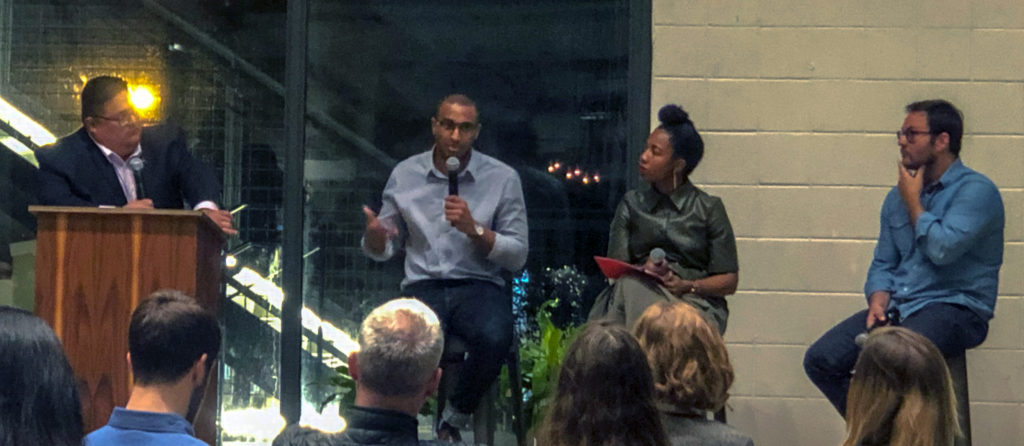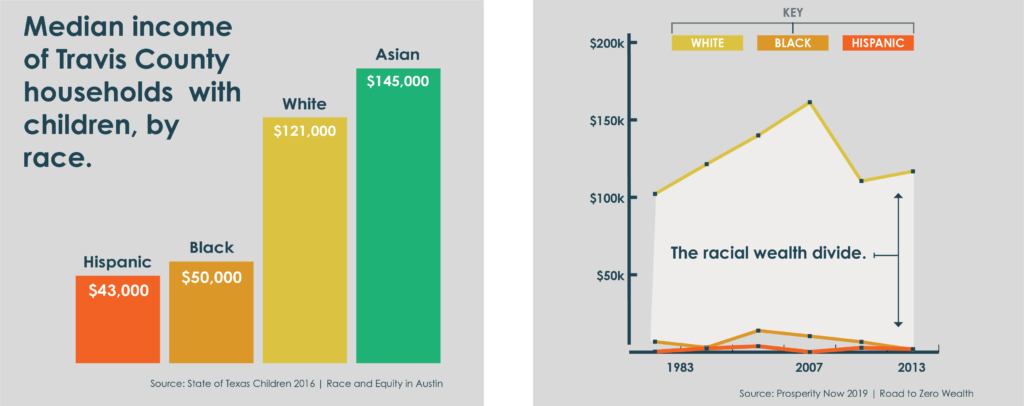Reimagining the American Dream in Austin

The current political climate has left a lot of us on edge about the future of this country. A national conversation about walls overpowers many of the policy discussions and systemic solutions we need to be having on the national, state and local levels.
Impact Hub Austin has partnered with SOCAP 365 to bring national conversations on the intersection of money and meaning to Austin. This month’s topic was “The New American Dream: Intergenerational Wealth for All.” The event welcomed a panel discussion moderated by Ruben Cantu, Executive Director of the Office of Inclusive Innovation and Entrepreneurship at UT Austin. Panelists included Wallon Walusayi, Co-Founder and CEO of 3Data, Virginia Cumberbatch, Director of the Division of Diversity and Community Engagement at UT Austin, and Steve Wanta, Founder, and CEO of JUST.
“When I think about intergenerational wealth,” Ruben Cantu opened up the discussion, “I can’t help but think of the American Dream. And the more I think about and research the idea of the American Dream the more I realize, people who look like me were not meant to be a part of it. And that needs to change.”
The conversation was a thoughtful and dynamic discussion to a complex problem. From the need for access to capital and investors of color to the power, we have as a local community to live and vote our values, to affect change.
According to Prosperity Now’s Road to Zero Wealth Report, it is projected that Black and Latino communities will be virtually bankrupted in the near future. Investment in these communities on a dynamic level is crucial in assuring that this does not happen.
“Income is very important for success. But your wealth is determinant of you and your family’s prosperity both in this city and country.” Steve Wanta said.
THE TRUTH ABOUT OUR HISTORY
Virginia Cumberbatch urged for honesty about both our country’s history and Austin’s. “We don’t necessarily do a good job of telling the truth about our history as a country and that boils down to Austin, too. When a White person’s grandfather served in World War II he was given a house and land. When my grandfather served in the same war, he was given a letter thanking him for his service. We have to be honest about the systemic racism in our country and how that’s affected wealth for generations.”
Austin’s historic racism affects our communities of color for generations as well. In the late 1880s, the US Supreme Court had a set of rulings that struck down segregationist zoning laws, so Austin and cities across the South started developing new policies to isolate communities of color. Communities like Clarksville, Wheatsville and other well-known West Austin areas were home to Black and Brown communities. But the 1928 Master Plan changed all of that.
The 1928 Master Plan of Austin was built to not only segregate but to remove the Black community from the more desired real estate in the city center to less desirable areas, that lacked community investment and development.
This systemic racism still affects our communities today. “Austin prides itself on being a progressive, nonracist city. But looking at our statistics and outcomes, we operate as a nonprogressive racist city.” Virginia Cumberbatch said.
LIVING AND INVESTING IN OUR VALUES
Public policy and law is important and necessary. But there are systems that exist in companies and educational institutions that are racist. We have the power to vote and speak our values that could affect real systemic change — and fairly quickly, too.
“It’s very important to be truthful to ourselves. We’re liberals in the ballot box but we’re not liberals in our investments.” Wallon Walusayi presented the lens of tech and startup space in Austin. “It’s crazy to be an entrepreneur, but being an entrepreneur of color has different challenges. There are so many times I walk into a room and I’m the only black man there. Out of hundreds of people. Developing empathy for that situation is important for perspective.”
“1% of venture capital money is invested in black business owners. Where I’m from in Milwaukee, I have a better chance of getting arrested than I do getting funded.” Walusayi went on to say.
And that’s a complex and cyclical issue. There are few black businesses being funded so there are even fewer black investors looking to support the solutions they have.
DISRUPTING THE SYSTEMS AGAINST US
“Who are the people who are not in the room tonight that need to be?” Ruben asked the audience.
Voting in the ballot box is important, but that’s beyond just voting for a representative. It’s about saying yes to having a train run through your neighborhood even if it may be inconvenient for you. It’s about saying yes to building and living in mixed-income developments when your biases come into play.
Living our values as a community is not only good but necessary. We all have a part to play in providing access to wealth for generations in Austin and in our country.
SOLUTIONS + OPPORTUNITIES
Each of our panelists and moderators are working to disrupt systems working against us. Learn more about the projects and how you can get involved.
The Office of Inclusive Innovation and Entrepreneurship focuses on addressing the income inequality gap for overlooked communities by helping them learn the tools of wealth creation, innovative thinking, community stewardship, and social impact.
The Division of Diversity and Community Engagement is a national model for integrating diversity and community engagement into the core mission of a university. It works with a broad range of student, faculty, staff, and community constituents to help The University of Texas at Austin connect its intellectual resources to communities across Texas and offer education to those who may face the greatest challenges in accessing it.
JUST invests in low-income, female entrepreneurs to create more resilient communities in America.
3Data is a VC backed tech startup that focuses on 3D data visualization through virtual and augmented reality.
Written by: Mindy Morgan
Marketing Manager, Impact Hub Austin

